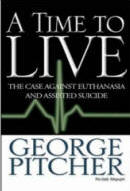
A Time to Live - The Case Against Euthanasia and Assisted Suicide
George
Pitcher (2010), Monarch Books, Oxford
160 pages; £8.99. ISBN: 978-1-85424-987-6
The book opens with a stunning one-liner, ‘I tried to kill my mother in 1993.’ The quasi-culprit is the Revd George Pitcher, who was, until recently, the religion editor of the Daily Telegraph, so he knows a thing or two about constructing a polemic. And here he rails convincingly against euthanasia as a whole and, in particular, the prospect of legalising assisted suicide.
His argument starts with a lucid assessment of how we have repositioned human life from a communal enterprise to a selfish me-thing. Autonomy, consumerism and the right to chose have proved toxic. This mindset shift from ‘us’ to ‘me’, via the Enlightenment and two World Wars, is the backdrop against which the premature taking of human life has become seemingly justifiable.
Pitcher then takes us on a tour of some euthanasia heartlands, namely, Oregon, Holland and Switzerland. He surveys their current terrain and then begins to bulldoze their laws and practices that are so admired by UK euthanasia advocates. It is powerful stuff. Pitcher teaches the jargon and exposes the propaganda – ‘death as a clinical treatment option’ is an unnerving prospect.
UK suicide law, ancient and modern, is reviewed and the various attempts to amend it are documented. The aims and tactics of the campaigning triumvirate of Lord Joffe, Lord Falconer and Dignity in Dying are roundly condemned. Palliative care is described and rightly admired and commended.
So far, so good. Then three-quarters of the way into the book, it nosedives. Pitcher, in attempting to explain suffering, puts on his (self-confessed) ‘liberal Anglican’ priest’s vestments and introduces theology. Not historic, orthodox, biblical theology, but open theism and process theology. He pits these against so-called ‘classical theology’ and inexplicably singles out Paul Helm as an oddball because he has the audacity to believe that ‘divine foreknowledge … and human freedom are compatible.’ Meanwhile, Pitcher proceeds to preach theological mumbo-jumbo – small wonder that liberal churches are largely empty.
The book's blurb has the Archbishop of Canterbury raving that it is, ‘an absolutely essential read’. Well, that is too overstated – the book is, alas, more like the proverbial curate’s egg. Nevertheless, if encroaching euthanasia is to be defeated, we and others, including this book’s author, must enlist as co-belligerents.
| Top p |